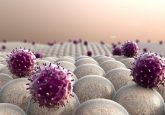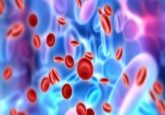HE4 expression found to be a potential therapeutic target in ovarian cancer

A recent study, the results of which were published by Nature’s Scientific Reports, investigated the role of human epididymis protein 4 (HE4) in modulating response to hormones and hormonal therapies in ovarian cancer. The research was directed by Richard G Moore at the Women & Infants Hospital (RI, USA).
HE4 is a hormone that is significantly overexpressed in ovarian cancer and is known to play a role in resistance to chemotherapy, particularly platinum-based therapies. The goal of the research was to identify how HE4 may modulate the response to hormone therapies in order to establish how such therapy could be better tailored for ovarian cancer patients.
“There is little known about the biologic functions of HE4 but we did know that there were hormonal responsive elements within the promoter region of the HE4 gene, which regulates gene expression. For this reason, we hypothesized that steroid hormones could influence expression of HE4 in ovarian cancer,” explained Moore.
The study resulted in multiple findings, including:
•Being able to bind to the estrogen receptor, hormonal therapies such as tamoxifen and fulvestrant are known to be effective in ovarian cancer. However, the efficacy of such therapies is decreased when the level of expression of the receptor is low. Moore’s group believes that this is due to epigenetic modifications leading to the alteration of the DNA structure, while leaving the DNA sequence unchanged. Overexpression of the receptor resulted in a decrease in DNA methylation in cell culture and in human tissue samples.
•Treating ovarian cancer cells with tamoxifen and fulvestrant caused HE4 to be translocated to the nucleus, promoting further gene expression in cancer cells.
•By using ivermectin, the group was able to inhibit the protein importin-4, which subsequently inhibited HE4 from translocating to the nucleus. If HE4 is inhibited and cannot be translocated to the nucleus, it is unable to affect gene expression. Inhibiting this nuclear accumulation of HE4 led to restored sensitivity to hormonal therapy.
Moore’s group will continue investigating the correlation between the expression of estrogen receptors in both primary and recurrent ovarian cancers and HE4 expression. Furthermore, research will continue with investigation into the role of importin inhibitors in chemoresistance to standard therapeutics, particularly in tumors overexpressing HE4.
“We are not certain but believe this might mean there could be a subset of women whose tumors are more likely to respond to hormonal therapy. Moreover, we might be able to eventually identify which tumors these are and target treatment,” stated Moore.
Sources: Lokich E, Singh R K, Han A et al. HE4 expression is associated with hormonal elements and mediated by importin-dependent nuclear translocation. Scientific Reports (4), doi: 10.1038/srep05500 (2014); Women & Infants Hospital press release




